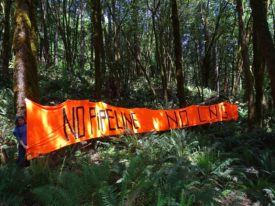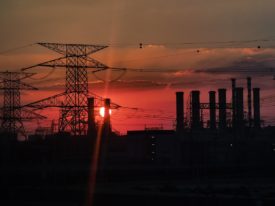Nicole
Seattle artist Andrew Waits’ project Boondock is a photographic narrative of Americans who have turned the traditional concept of home on its head and, for reasons ranging from the economic collapse to sustainability, are living out of vehicles. Most images are accompanied by an audio piece and short narrative. I found it beautiful, interesting, and humane.
Clark
The New York Times’ Sunday Book Review likes The Happy City, by Vancouver writer and urbanist Charles Montgomery. It’s now on my reading list!
Serena
I guess it was no longer enough for them to be everyone’s favorite, adorable marine creature. Behold: sea otters, the Pacific Northwest’s surprisingly powerful little climate change fighters. How do they do it? An insatiable appetite for sea urchins, apparently. See more background on the project here, and note local diver-photographer-videographer Laura James in the credits!
Eric
On the occasion of the epic NFC championship matchup this weekend, by far the most important writing in Cascadia recently was about Seattle’s longstanding inferiority complex to San Francisco. Danny Westneat’s exploration will be referenced for years to come, and Knute Berger’s contribution is a must-read too. It’s weird how football can be about so much more than sports. It’s also weird how much I loathe the 49ers, as all good locals do.
But wait, the NFL is a nonprofit organization? What… the…
Unless it qualifies as a religious organization, nonprofit status for pro football has got to be one of most egregious abuses of federal tax policy I’ve ever heard of.
Want to know what it’s like to have a coal terminal in your community? Ask the residents of Mobile, Alabama:
Take 75-year-old Carolyn Utsey, for instance. For the last 13 years, she has owned a home built in 1889 in Mobile’s Church Street East neighborhood. And for the last 13-years, she has been hosing coal dust, emitted by the McDuffie Coal Terminal, off her front porch… A study commissioned in 2007 by Church Street East residents showed dust collected from the exteriors of five homes ranged in coal content from a low of 10 to 20 percent to a high of 30 to 40 percent.
Lovely.
New opinion research from Matt Baretto finds that Latinos are strongly opposed to new coal export terminals.
Here’s a Facebook page collecting material about “bomb trains.”
Dominic Holden on the state transportation department resorting to increasingly bizarre analogies to explain the giant drilling machine stuck underneath downtown.
Is the Canadian government embarking on a campaign of book-burning of environmental science? The evidence is alarming. As The Tyee reports:
Scientists have variously condemned the dismantling of the one of the world’s finest aquatic libraries as a natural tragedy, a series of criminal acts and information destruction unworthy of a democracy.
“The fact that many materials were thrown away or given away is heartbreaking to those of us who are dedicated to this field of research (marine science and fisheries) and the history of science in Canada,” says Peter Wells, a prominent marine environmental scientist at Dalhousie University.
CBC has more damning reporting of recent events.
Anna
A data portrait of who is poor in America 50 years after the start of the “war on poverty.”.
And here’s another snapshot of poverty in charts.
It looks like Americans are getting behind a hike in the minimum wage. Here’s what American Progress Action reports:
Americans of all stripes are overwhelmingly supportive of this commonsense policy: a recent poll on the low end of support found 72 percent support a minimum wage hike, including 52 percent of Republicans. Another poll out last week found that increasing the minimum wage—and indexing it for inflation—garnered 80 percent support, including 67 percent of Republicans.
And, the evidence that a minimum wage increase will reduce poverty.
And Jon Stewart was simply brilliant in his response to climate denial spurred by the early January cold snap. Maybe it’s just because he has such great (and unfathomably absurd) fodder to work with or because it’s close to my heart, but I think this is some of his best work ever.








